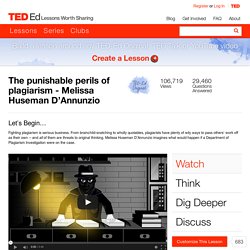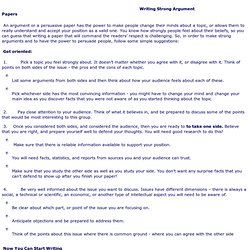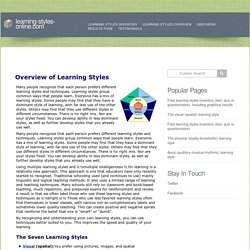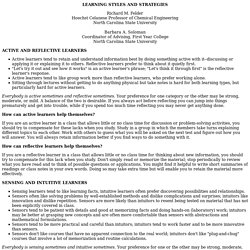

Free ebooks. On August 26 2020, the Project Gutenberg website underwent some major changes.

These changes had been previewed since early 2020, and visitors to the old site were invited to try the new site, including giving input via a brief survey. The old site is no longer available. If you found yourself on this page unexpectedly, it is because an old page was redirected here. Please use the navigation menus at the top of the page to find what you were looking for. All of the functionality, and most of the content, from the old site is still here - but in a different location. Below, find a description of the motivation behind the changes. THANK YOU for your patience as we continue to update the website to fix remaining problems, and maintain all the functionality and content that visitors expect. Known issues and “TO DO” items Updates on fixed items. The punishable perils of plagiarism - Melissa Huseman D’Annunzio. The following are excellent resources for teachers and students regarding plagiarism and the proper citation of sources: The OWL at Purdue (Online Writing Lab) Here you'll find numerous articles on topics such as Contextualizing Plagiarism, Authorship and Popular Plagiarism, Copyright, Collaborative Authorship, Avoiding Plagiarism, Summarizing, Paraphrasing, Quoting, and using MLA and APA citations.

Also, you can find extensive Research and Citation Resources on topics such as Conducting Research, Using Research, APA Style, MLA Style, and Chicago Manual of Style. The Plagiarism Spectrum: Instructor Insights into the 10 Types of Plagiarism TurnItIn, the study’s authors, polled both higher and secondary education instructors in order to produce this White Paper. The authors acknowledge that, “the lines of what constitute plagiarism are blurring as the Internet reshapes culture and education” (3), and they provide definitions and examples of the ten most common types of plagiarism.
Essay Writing. Summary: The Modes of Discourse—Exposition, Description, Narration, Argumentation (EDNA)—are common paper assignments you may encounter in your writing classes.

Although these genres have been criticized by some composition scholars, the Purdue OWL recognizes the wide spread use of these approaches and students’ need to understand and produce them. Contributors:Jack Baker, Allen Brizee, Elizabeth AngeliLast Edited: 2013-03-10 11:46:44 What is an argumentative essay? The argumentative essay is a genre of writing that requires the student to investigate a topic; collect, generate, and evaluate evidence; and establish a position on the topic in a concise manner. Please note: Some confusion may occur between the argumentative essay and the expository essay. Argumentative essay assignments generally call for extensive research of literature or previously published material. The structure of the argumentative essay is held together by the following. Body paragraphs that include evidential support. Writing Strong Argument Papers. Writing Strong Argument Papers An argument or a persuasive paper has the power to make people change their minds about a topic, or allows them to really understand and accept your position as a valid one.

You know how strongly people feel about their beliefs, so you can guess that writing a paper that will command the readers’ respect is challenging. So, in order to make strong arguments and to have the power to persuade people, follow some simple suggestions: Get oriented: 1. 2. 3. 4. Now You Can Start Writing 1. Quotbook - Learn success, leadership, love and more from famous people.
Overview of learning styles. Many people recognize that each person prefers different learning styles and techniques.

Learning styles group common ways that people learn. Everyone has a mix of learning styles. Sleep learning is possible: Associations formed when asleep remained intact when awake. Is sleep learning possible?

A new Weizmann Institute study appearing August 26 in Nature Neuroscience has found that if certain odors are presented after tones during sleep, people will start sniffing when they hear the tones alone -- even when no odor is present -- both during sleep and, later, when awake. In other words, people can learn new information while they sleep, and this can unconsciously modify their waking behavior.
Sleep-learning experiments are notoriously difficult to conduct. For one thing, one must be sure that the subjects are actually asleep and stay that way during the "lessons. " The most rigorous trials of verbal sleep learning have failed to show any new knowledge taking root. Prof. In the experiments, the subjects slept in a special lab while their sleep state was continuously monitored. What's Your Learning Style?
Learning Styles Quiz Image Search Results. Index of Learning Styles Questionnaire. Felder & Soloman: Learning Styles and Strategies. Richard M.

Felder Hoechst Celanese Professor of Chemical Engineering North Carolina State University Barbara A. Soloman Coordinator of Advising, First Year College North Carolina State University Active learners tend to retain and understand information best by doing something active with it--discussing or applying it or explaining it to others. Reflective learners prefer to think about it quietly first. Everybody is active sometimes and reflective sometimes.
How can active learners help themselves? If you are an active learner in a class that allows little or no class time for discussion or problem-solving activities, you should try to compensate for these lacks when you study. How can reflective learners help themselves? If you are a reflective learner in a class that allows little or no class time for thinking about new information, you should try to compensate for this lack when you study.